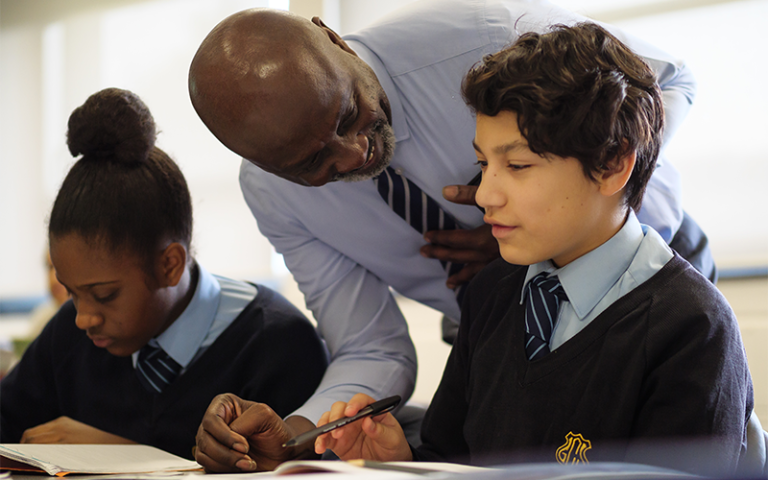UCL to lead new National Consortium for Languages Education
3 March 2023
IOE, UCL's Faculty of Education and Society, has been selected to lead a new nationwide Language Hubs programme, providing thousands of students across England with high quality language teaching via a centre of excellence.

Funded by the Department for Education (DfE), the scheme is backed by £14.9 million over the next three years and aims to increase uptake of languages qualifications in Key Stage 4 and 5 in English state-funded schools.
The programme will be led by IOE, working with a consortium of stakeholders, including the Goethe-Institut and the British Council. It will involve the establishment of the National Consortium for Languages Education (NCLE) and a national network of up to 25 lead hub schools across England.
Recruited in phases, each lead hub school will deliver training to up to seven partner schools to improve standards of language teaching and learning across the country. The lead hubs will engage with schools to strengthen and expand the languages offer, enabling more effective transition from Key Stage 2 to Key Stage 3, as well as ensuring that more pupils aged 14 to 18 from all backgrounds have the opportunity to study languages through to Key Stage 5.
Nick Gibb, Minister for School Standards said: “Our economy needs people who can communicate across the globe and trade with overseas businesses. This programme is about ensuring we have the next generation of young people with the languages needed to compete on the world stage.
“Raising academic standards in schools has been a key priority for the Government since 2010. Our range of Curriculum Hubs - exemplary schools spreading their best practice - have played a huge part in improving the quality of teaching in schools. Language teachers will benefit from rigorous training and knowledge, working with experts, to improve language lessons in both primary and secondary schools, opening up these global opportunities for generations to come.”
This initiative will support the DfE’s ambition that 90% of Year 10 pupils in state-funded schools study a combination of the core academic subjects as part of the English Baccalaureate (EBacc) by 2025, which includes a language.
The programme will provide thousands more young people with high quality language teaching as part of a programme to boost the number of pupils taking languages such as French, German and Spanish, and other languages, at GCSE and A level.
Building on the success of IOE’s existing Mandarin Excellence Programme, which has delivered intensive Mandarin learning to almost 10,000 pupils since its inception in 2016, the new centre will incorporate a ringfenced German Promotion Project (GPP). Working closely with the Goethe-Institut, this project will involve increasing the number of German teachers and learners in schools and raise awareness of the benefits of studying both German language and culture.
Miguel Berger, German Ambassador to the United Kingdom, said: “The creation of the National Consortium for Languages Education is an important and welcome step towards strengthening language teaching in England. The decline in the numbers of pupils studying German is dramatic. I am hopeful that the German Promotion Programme can reverse this trend, incentivising and encouraging language learning across the school sector. Learning languages opens gateways into other cultures, fostering friendship, trust and understanding across borders.”
In addition, NCLE and the hubs will support schools to develop a structured and inclusive approach to the wide range of languages increasingly spoken in the UK, such as Bengali and Polish, developing a new Home, Heritage and Community Languages (HHCL) initiative.
The initiative is a positive step towards recognising the multilingual skills of minoritised groups across the UK and enhancing community cohesion by broadening the language curriculum beyond traditional ‘modern foreign languages’ and investing in the nation’s multilingual and intercultural outlook.
UCL President and Provost Dr Michael Spence said: “As a university that thrives on our global connections, I’m so pleased that UCL will be even more closely involved in building the language capabilities of whole generations of young people. Equipping them with these skills and new perspectives will not only expand their own horizons as they forge their own paths in the world, it will also be a not insignificant action for racial equality, by fostering more recognition for the diverse ethnic backgrounds in our communities.
“As London’s global university, I’m excited UCL will be here to work alongside those communities and industries to strengthen global ties through language.”
The NCLE will carry forward the principles of the Bauckham Review (Modern Foreign Languages Pedagogy Review (2016)) led by expert headteacher and linguist Sir Ian Bauckham CBE.
Professor Li Wei (Director and Dean, IOE) said: “Language skills and intercultural understanding widen opportunities for individuals, communities and society. With our consortium partners, we are delighted to be taking forward this next step in re-energising language teaching in schools across the country, for all learners, grounded in the principles of the Bauckham Review.
“At IOE, we are equally delighted to be extending our work in supporting teachers’ professional development, including as provider, with the British Council, of the Mandarin Excellence Programme, and as a provider for the Early Career Framework and National Professional Qualifications programmes.
“On a more personal note, as a professor of applied linguistics I am very much looking forward to working with stakeholders to realise the multilingual potential of the nation, across the rich breadth of languages in our communities.”
Links
- National Consortium for Languages Education (NCLE)
- DfE announcement
- Mandarin Excellence Programme
- British Council
- Goethe-Institut
- Early Career Framework
- National Professional Qualifications
- Dr Michael Spence’s biography
- Professor Li Wei’s Q&A profile
- Sir Ian Bauckham CBE’s profile
- UCL Consultants
Media contact
Chris Lane, UCL Media Relations
Tel: +44 (0)20 7679 9222
Email: chris.lane@ucl.ac.uk
Image
Teacher and secondary school student. Credit: Phil Meech, for UCL.
 Close
Close

